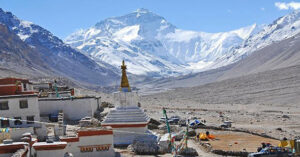 Lithium has been discovered in the vicinity of Mount Everest in Tibet reports Chinese state media the globatimes.cn. A Chinese scientific research team has announced that this new find could be China’s third-largest deposit of the metal after “the Bailong Mountain site, in Northwest China’s Xinjiang Uygur Autonomous Region, and the Jiajika lithium deposit, in Southwest China’s Sichuan Province,” reports globatimes.cn on April 15 quoting China Science Daily.
Lithium has been discovered in the vicinity of Mount Everest in Tibet reports Chinese state media the globatimes.cn. A Chinese scientific research team has announced that this new find could be China’s third-largest deposit of the metal after “the Bailong Mountain site, in Northwest China’s Xinjiang Uygur Autonomous Region, and the Jiajika lithium deposit, in Southwest China’s Sichuan Province,” reports globatimes.cn on April 15 quoting China Science Daily.
Qin Kezhang, head of the research team, said they estimate that there is 1.01 million tonnes of lithium oxide in the mine, saying this is according to “quite conservative” calculations and that “The average content rate of lithium oxide was about 1.3 percent”. The globatimes.cn report continues, saying that according to Qin, if the content of “lithium oxide exceeds 0.8 percent, the lithium ore has industrial value. Of the 59 samples they collected from the site, 44 met the standards for industrial exploitation.” Qin Kezhang continued, “The Qiongjiagang lithium has good mining conditions — it has high-quality ore, transportation to it is convenient considering the mining area is connected to rural cement roads … the ore body is exposed, and no deep excavation is required”.
According to a separate report by Sixth Tone, Chinese Researchers Uncover Massive Lithium Mine in the Himalayas, under the subtitle Experts say the recent finding could help reduce China’s over-dependency on imported lithium resources, the newly discovered source is located 5,000 metres above sea level on the Tibet Plateau, also known as the Qinghai –Tibet Plateau.
Sixth Tone’s report says that lithium ore is an essential element in the manufacturing of electric vehicle batteries, and that although China has the sixth-largest lithium reserves in the world, the country still imports 75% of its lithium requirement from around the world to meet its demand.
The researchers say the project is still in its initial stage and that further detailing and planning is required. This area is in Tibet, but it is not expected that Tibetans in the region will have a say in whether or not this resource will be exploited – since the Chinese occupation, China regularly opens mines against the wishes of the local people who do not benefit in any way, and have to watch the exploitation of their traditional sacred places. The Chinese Communist Party’s mining activities in Tibet have drawn criticism from environmentalists and rights groups around the world.




 Print
Print Email
Email